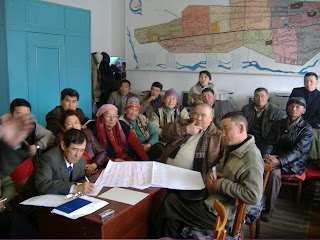
Nice run down to Bucharest yesterday – with a stop in Ploiesti to have lunch with Daniela. Nicolae Iorga - a great Romanian historian and politician - said 100 years of Ploiesti It's an ugly city - which begins beautifully - referring to its lovely Boulevard (of chestnut trees) which runs from the central station and was in colourful spring bloom yesterday. Previously known as Romania’s oil centre, the city is now clean. We went to the recently restored Boulevard Restaurant beside the Clock museum. It is roomy; aesthetically pleasing; gives a sense of the old Romania - and is a place to linger. The mushroom soup was the best I’ve ever tasted; and its Romanian Winter platter also very tasty. It draws on the great fish market just a few minutes away; cooks only to order; has a good range of wines (including half a litre house wine for only 2 euros). A rare example here of customer attention (even if the waiter did forget about my main course!)
(by the way, these 2 photos are not of Ploiesti! They are by way of illustration to the themes which now follow
BBC World Service is always a good listen – particularly after an absence. And Peter Day’s Global Business is a model of good conversation in a field which is generally so boring. This morning I was soon hooked on the conversation he was having with Ranjay Gulati about the latter’s new book. The starting point was that the business rhetoric about the customer being the core of company’s thinking was not borne out in reality. The emphasis, he argued, given to reengineering and sheer survival meant that techniques and products were the foremost thing in managers’ minds. Even their much-vaunted customer consultations focussed on their product – rather than trying to understand the wider context in which the customer uses it. And the departmental silos just compounded their distance from the customer. How often have we heard this? Rosabeth Kanter talked about it 27 years ago (in her Change Masters – corporate giants at work). Shoshanna Zuboff’s The Support Economy: Why Corporations are Failing Individuals and the Next Episode of Capitalism made the same point 6 years ago in a more sustained critique. And Anthony Jay’s spoof article “Democracy, Bernard? It must be stopped!” suggests that structures are deliberately created to ensure that policy-makers are isolated from those they are supposed to serve (see key papers on my website). As Day put it wryly – “Big ideas – common sense!”
The book, by the way, has the rather awful title of “Reorganise for resilience – putting customer at the centre of your business" – available already on googlebooks - But you can read the basic idea in a shorter piece he wrote for Harvard Business review.
There are two reasons why I was hooked (apart from the style of the conversation). First it was the issue of departmental silos that first brought me into this field of politics and public administration – I could see that people in the various council departments were well-intentioned so what was it that prevented from (a) seeing things in a less perverse way and (b) cooperating with others? It started my interest in organisational structures.
The second reason is that my immersion in the field of government has made me so impatient of the smug rhetoric I hear both from insiders and those from outside who purport to have the answers to government problems – the think-tankers and consultants. So I am so happy to hear someone dare to say that the Emperor is naked!
The public sector these days needs no convincing of the need for change – it has indeed become the way to show virility and to make your reputation. But the techniques have become predominant – we need to return to the simplicities! We do need to have conversations, listen, think and act (or is to act and think??)
I had to turn BBC World off when they suddenly terminated a conversation which was beginning to explore the reasons for the uprising in Kyrgyzstan – and switched to golf news. Who makes the judgement that listener more interested in golf than Kyrgyzstan? Is this yet another example of producer interest? I noticed one reader of a Guardian “Comment is Free” article wanted some background reading on the country. Google for “Understanding Politics in Kyrgyzstan” by Askat Dukenbaev and William W. Hansen; and go on the website of International Crisis Group – and get their December 2005 report on the Failing State of KR.
ps a note for posterity - the first photo is of a small window in the superb Queen Mary complex in Balcik, Bulgaria. I took the second photo from my car as I was returning to Tashkent from a wine tasting at Pashkent, Uzbekistan. It gives a good sense of the reality for most people in these central asia states






